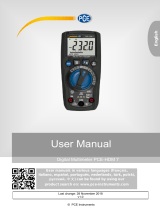
ProcessMeter™
Safety Information
3
• The battery door must be closed and locked
before you operate the Product.
• Replace the batteries when the low battery
indicator shows to prevent incorrect
measurements.
• Comply with local and national safety codes.
Use personal protective equipment (approved
rubber gloves, face protection, and flame-
resistant clothes) to prevent shock and arc
blast injury where hazardous live conductors
are exposed.
• Do not apply more than the rated voltage,
between the terminals or between each
terminal and earth ground.
• Do not work alone.
• Limit operation to the specified measurement
category, voltage, or amperage ratings.
• Use Product-approved measurement category
(CAT), voltage, and amperage rated
accessories (probes, test leads, and adapters)
for all measurements.
• Measure a known voltage first to make sure
that the Product operates correctly.
• Use the correct terminals, function, and range
for measurements.
• Do not touch voltages > 30 V ac rms, 42 V ac
peak, or 60 V dc.
• Do not use the Product around explosive gas,
vapor, or in damp or wet environments.
• Do not use the Product if it operates
incorrectly.
• Examine the case before you use the Product.
Look for cracks or missing plastic. Carefully
look at the insulation around the terminals.
• Do not use test leads if they are damaged.
Examine the test leads for damaged
insulation, exposed metal, or if the wear
indicator shows. Check test lead continuity.





















